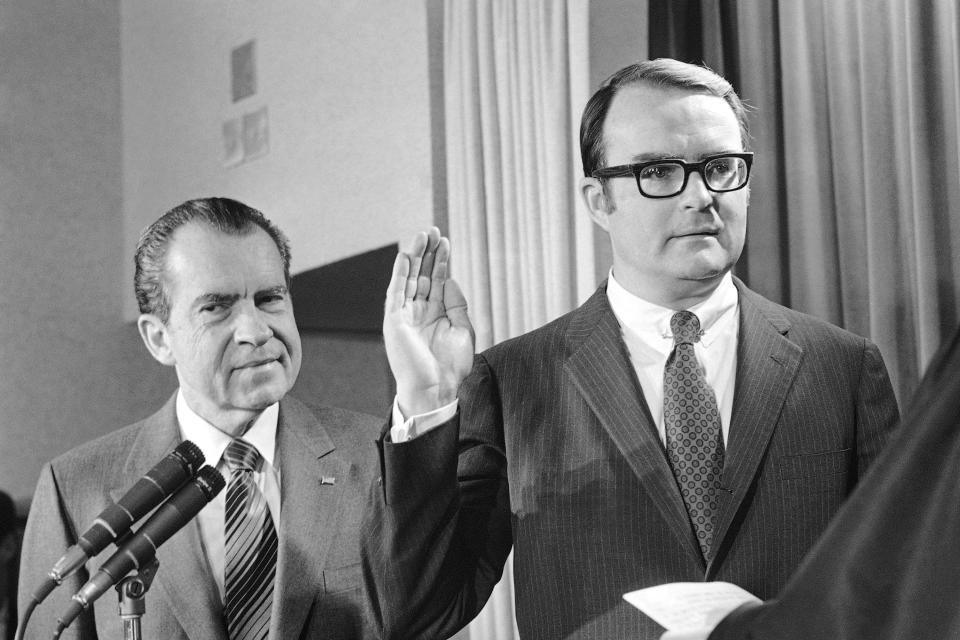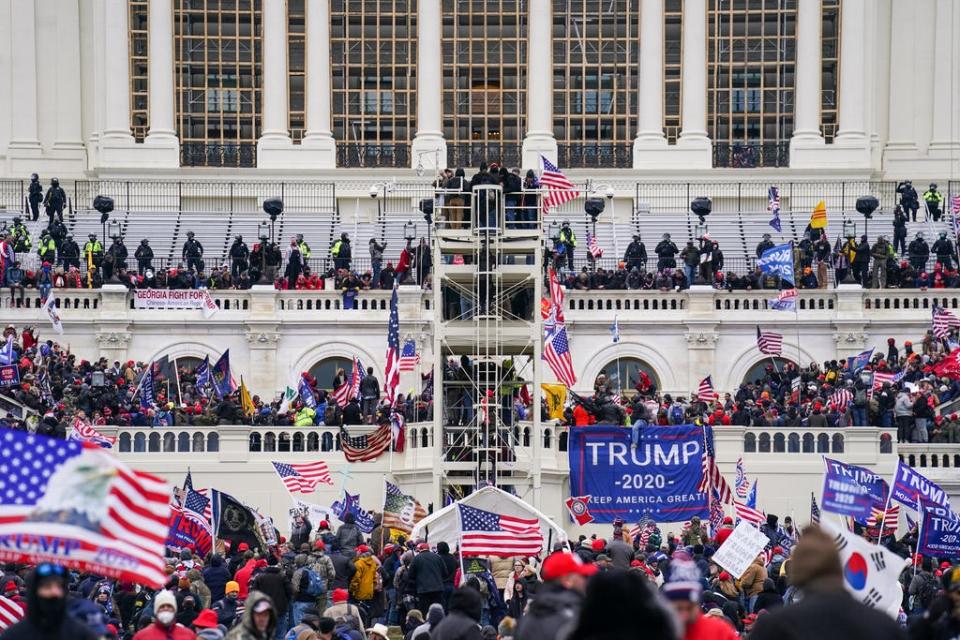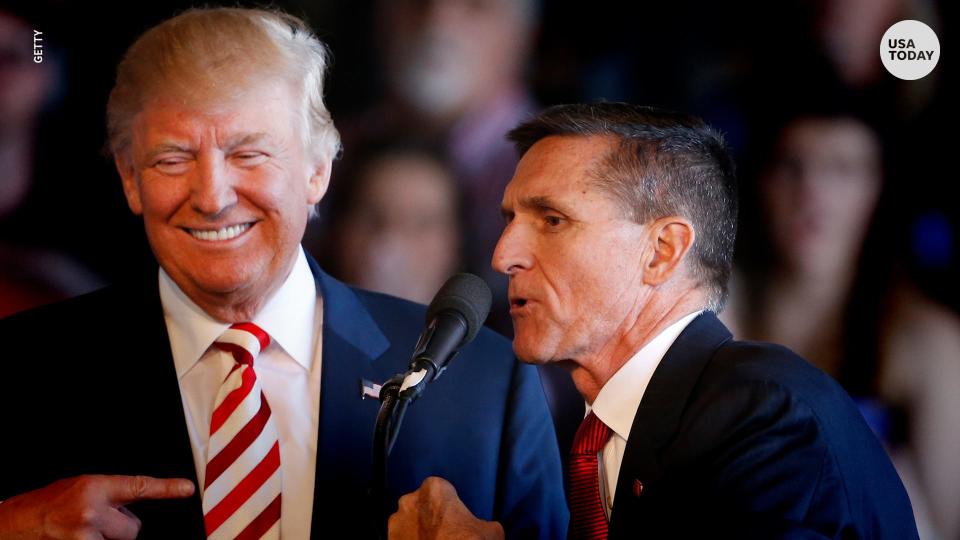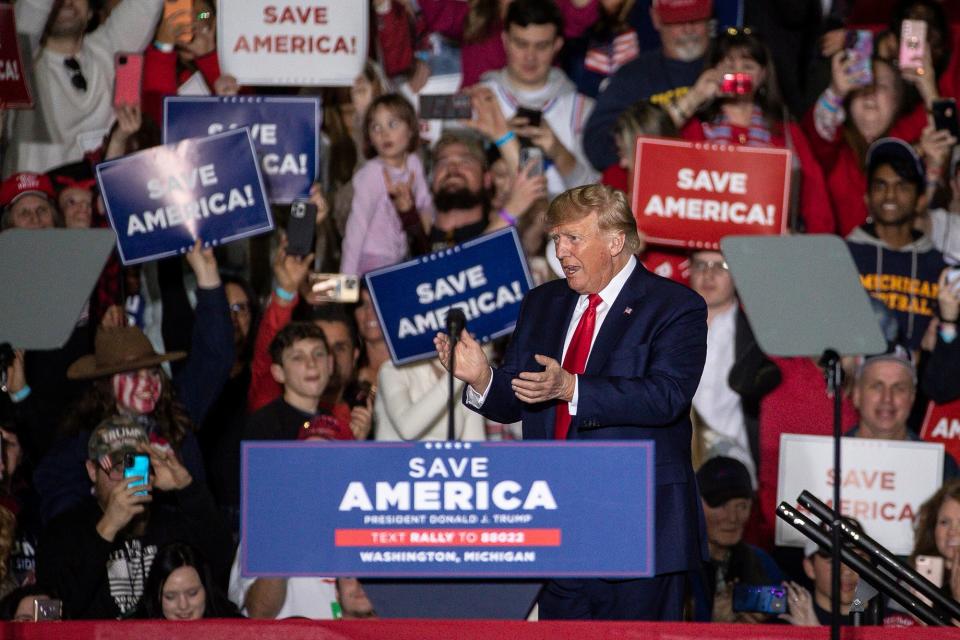The Trump GOP is in ruins and every Jan. 6 committee hearing digs the hole deeper
- Oops!Something went wrong.Please try again later.
Nearly 20 years ago, Carl Bernstein of Watergate reporting fame called the Nixon presidency “absolutely sui generis” – utterly unique – in U.S. history. But then, as he and Bob Woodward wrote this year in their 50th anniversary foreword to “All The President’s Men,” along came Donald Trump.
Surpassing Richard Nixon’s notoriety, paranoia, insecurity and reckless flouting of rules, laws and the Constitution is tough, but Trump is already winning in a landslide.
Cassidy Hutchinson’s revelatory testimony last month to the House Jan. 6 committee prompted lawyers, pundits, onetime Trump aides and maybe even some rank-and-file Republicans to reassess how they view the former president, the threat he posed and his vulnerability to prosecution.
There could be more of that after Tuesday’s hearing, with its focus on extremist groups and, as Rep. Adam Schiff, D-Calif., has said, “any connection between these dangerous groups and the White House.”
Reassessing Nixon instead of Trump
My threat assessment of Trump has been at red alert since he declared his candidacy in 2015, and it will never change. But I do find myself reassessing Nixon – in part because Trump’s Supreme Court just ruled that the Environmental Protection Agency needs permission from Congress to regulate the power plant emissions that are driving climate change and its consequences such as heat, droughts, floods and rising sea levels.
CLIMATE CHANGE? These five steps will help us kick our fossil fuel addiction and save the planet
The case reminded me that Nixon was the president who created the EPA, and that the court earlier this year curbed the authority of another agency Nixon signed into law – the Occupational Safety and Health Administration – by ruling that OSHA could not impose a COVID vaccine-or-test requirement in workplaces.

Of course, Nixon is also the president who successfully subverted the 1972 electoral process with what Woodward and Bernstein call “a massive campaign of political espionage, sabotage and disinformation.” It produced a weak Democratic nominee and a Nixon victory over antiwar Sen. George McGovern, who won only Massachusetts and Washington, D.C.
It also produced a cover-up of historic illegality and consequences.
Trump similarly attempted to subvert the 2020 election with his claims of fraud and bids for foreign help from Ukraine and Russia. When he lost, he opened a new chapter: insisting he won (“a deception that even exceeded Nixon’s imagination,” Woodward and Bernstein write) and encouraging an armed mob to march to the Capitol on Jan. 6, 2021, the day Congress was constitutionally required to finalize the presidential election. We all know what happened next: a violent insurrection that led to people dying and could have led to President-for-Life Donald Trump.
“When somebody keeps themselves in power regardless of the law and the votes, that is a dictatorship. That’s ultimately what he was trying to put in place,” Noah Bookbinder, president of the Center for Responsibility and Ethics in Washington (CREW), said in an interview.

The three articles of impeachment against Nixon outlined multiple egregious abuses of power that recall those against Trump. The first article alone, on obstructing justice, had nine examples of ways Nixon and his subordinates tried to cover up covert activities, among them the attempted theft of political intelligence from Democratic Party headquarters at the Watergate. Hush money, false statements, misuse of the CIA, interference in federal investigations – the list is long.
Article II said he financed a “secret investigative unit” within his office that used the IRS, the FBI, the Secret Service and other agencies to violate the rights of U.S. citizens.
And then there’s Article III: He “willfully disobeyed” four subpoenas from the House Judiciary Committee, “thereby assuming to himself” the power of impeachment that rests solely with the House of Representatives.
EX-TRUMP AIDE MICK MULVANEY: 'Things could get very dark for the former president'
So much was different then. Shame still existed and Republican tribal loyalties went only so far. Nixon never was impeached by the House: A day after three senior GOP senators told him he did not have the votes to stay in office, he announced he would resign. On Aug. 9, 1974, he stepped down, the only president ever to do so.

Yet Trump has even more claims to uniqueness. He’s the only president ever impeached twice, and the only one since the founding who tried to prevent the peaceful transfer of power. In the 2022 foreword of "All the President's Men," Woodward and Bernstein call Trump “the first seditious president in our history.”
He is almost certainly the only president who told his administration to ignore requests for information from Congress, announced that “we’re fighting all the subpoenas” and keeps stonewalling as an ex-president. Nor was Trump shy about trying to obstruct justice – special counsel Robert Mueller’s April 2019 report alone offered 10 examples.
CREW, Bookbinder's group, released a report in March entitled “President Trump’s staggering record of uncharged criminal conduct” that found he "has been credibly accused of committing at least 48 criminal offenses" while president. The categories include campaign finance crimes and cover-up, obstruction of the Russia and special counsel investigations, destruction of presidential records, attempts to steal the 2020 election, attempts to get Ukraine to interfere in the 2020 election, false public financial disclosure reports, and pressuring federal officers to use their official positions for partisan politics ("criminal violation of the Hatch Act").
Watergate overshadowed Nixon's legacy, but he was impressively constructive: creating EPA and OSHA, making historic overtures to China, and proposing major social advances such as universal health care coverage and a guaranteed minimum income for families with children.
Trump was more interested in profits and power. Because he did not divest from his business interests during his presidency (another first), CREW calculates he racked up 3,737 conflicts of interest, with potentially hundreds or thousands more. Trump visited his properties 547 times during his presidency and mentioned them 378 times. His golf courses, resorts and Washington, D.C., hotel raked in millions from politicians, political committees, senior administration officials, lobbyists and foreign visitors.
The U.S. Office of Special Counsel and CREW, meanwhile, found dozens of civil Hatch Act violations by dozens of senior administration officials.
More from Jill Lawrence:
Is this the beginning of the end for Trumpism or the Republican Party?
Standing with Ukraine won't fix the GOP. Caring about democracy at home might help.
The big picture is frightening, especially in a Jan. 6 context. “All of those Hatch Act violations were Donald Trump trying to mobilize every power of the government, the authority of every official in the government, to keep himself in power,” Bookbinder told me. “The conflicts of interest, he was systematically using the power of government to promote himself and enrich himself.”

And let's not forget protecting himself, his friends and his allies. He gave pardons or clemency to Michael Flynn, Roger Stone, Steve Bannon, Paul Manafort – people "who likely have information that could be incriminating to him. That's a vast abuse of power," Bookbinder told me.
In a January 2021 Vanity Fair piece headlined “Trump pardons nearly 150 of his favorite criminals on the way out the door,” Bookbinder called the pardons one more way Trump had failed “to live up to the ethical standard of Richard Nixon.”
Now Trump is dangling pardons for defendants in the Capitol attack, should he run and win in 2024. More than 855 people have been arrested so far.
So many public scandals, so little time
The sheer volume of Trump scandals and outrages has made it hard to keep up with them, much less follow up in any meaningful way. Trump is also somewhat protected because he is so brazen.
“If you do it out in the open, people assume it must be OK,” Bookbinder said, adding that's part of Trump's appeal: "It fires up his supporters."

Since the Jan. 6 committee started releasing tidbits and holding public hearings, we have learned that, in fact, not everything is already known. Each session showcases new details. When the panel announced a surprise witness, onetime Nixon White House counsel John Dean was skeptical. “BETTER BE A BIG DEAL,” he tweeted. After Cassidy Hutchinson testified, Dean thanked her and tweeted: “IT WAS A BIG DEAL AND IT WILL GROW BIGGER!”
It almost makes a person miss Nixon. I am not going soft on him, but I do have nostalgia for that era. It was a time when a Republican president could create new agencies to deal with pollution and workplace hazards; when, less than two years after Nixon won 61% of the vote, 57% of Americans said he should be removed from office; when Republican senators could tell a president he was doomed and should resign, and that president was sufficiently humiliated and reality-based to take their advice.
What I would give to have those days back.
Jill Lawrence is a columnist for USA TODAY and author of "The Art of the Political Deal: How Congress Beat the Odds and Broke Through Gridlock." Follow her on Twitter: @JillDLawrence
You can read diverse opinions from our Board of Contributors and other writers on the Opinion front page, on Twitter @usatodayopinion and in our daily Opinion newsletter. To respond to a column, submit a comment to letters@usatoday.com.
This article originally appeared on USA TODAY: Trump accountability: Could Jan 6 hearings finally make it happen?

